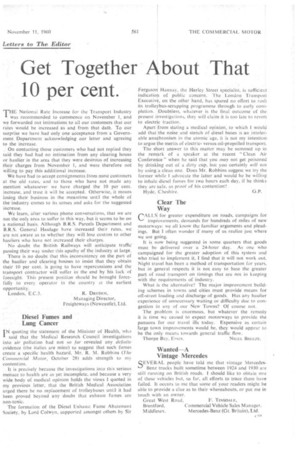Get Together About That 10 per cent.
Page 99

If you've noticed an error in this article please click here to report it so we can fix it.
THE National Rate Increase for the Transport Industry . was recommended to Commence on November 1, and We forwarded out intimations to all our customers that our rates would be increased as and from that da.t. To our surprise we have had only one acceptance frOm a Government Department acknowledging our letter and agreeing to the increase.
. On contacting those customers who had not replied they said they had had no intimation from any clearing house or haulier in the area that they were desirdus of increasing their charges from November 1, and were therefore not willing to pay this additional increase.
• We have had to accept consignments from most customers at the old rates, and to those who have not made any mention -whatsoever we have charged the 10 per cent. increase, and trust it will be accepted. Otherwise, it means losing their business in the meantime until the whole of the industry comes to its senses and asks for the suggested increase. We learn, after, various phone conversations, that we are not the only area to suffer in this way, but it seems to be on a national basis. Although B.R.S. Parcels Department and B.R.S. General Haulage have increased their rates, we are not aware as to whether they will lose custom to other hauliers who have not increased their charges.
No doubt the British Railways will anticipate traffic" passing their way under this apathy of the industry at large. There is no doubt that this inconsistency on the part of the haulier and clearing houses to insist that they obtain their 10 per cent. is going to have repercussions and the transport contractor will suffer in the end by his lack of foresight. This present position should be •brought forceto every operator in the country at the earliest opportunity. . London., E.C.3.
R. DRYDFN,
• Managing Director, Freightways (Newcastle), Ltd.
• Diesel Fumes and Lung Cancer
IN, quoting the statement of the Minister of Health, who said that the Medical ResearchCouncil investigations into air • pollution had not so far revealed any definite evidence (the italics are mine) to sitggest •that such fumes create a specific health hazard, Mr. R. M. Robbins (The Commercial Motor, October 28) adds strength to my contention.
. It is precisely because the investigations into this serious menace to health are as yet incomplete, and because a very wide 'body of medical opinion holds the views I quoted in my previous letter, that the British • Medical Association urged there be no replacement of trolleybuses until it had been proved beyond any doubt that exhaust fumes are non-toxic.
The formation of the Diesel Exhaust Fume Abatement Society, by Lord Colwyn, supported amongst others by Sir Ferguson Hannay, the Harley Street specialist, is sufficient indication of public concern. The London Transport Executive, on the other hand, has Spared no effort to rush its trolleybus-scrapping programme through to early coMpletion. Doubtless, whatever is the final outcome of the present investigations, they will claim it is too late to revert to electric traction.
Apart from stating a medical opinion:. to which I would add that the noise and stench, of diesel buses is an :intolerable anachronism in the atomic 'age, it is not my intention
to argue the merits of electricversus oil-propelled transport.
The short answer to this matter may be summed up in the remark of a speaker at the recent "Clean Air Conference" when he said that you may not get poisoned by drinking out of a dirty cup, but you certainly will not by using a•clean one. Does Mr. Robbins suggest we try the former while I advocate the latter and would he be willing to inhale diesel fumes for two hours each day, if he thinks they are safe, as proof of his contentiOn?
Hyde, Cheshire. G.P.
Clear The Way
CALLS for greater expenditure on roads, campaigns for improvements, demands for hundreds of miles of new motorways; we all know the familiar arguments and pleadings. But I often wonder if many of us realize just where we are going.
It is now being suggested in some quarters that goodS must be delivered over a 24-hour day. As one who campaigned for the greater adoption of this system and who tried to implement it, I find that it will not work out. Night travel has been a method of transportation for years, but in general respects it is not easy to base the greater part of road transport on timings that are not in keeping with the requirements of industry.
What is the alternative? The major improvement building schemes in towns and cities must provide means for off-street loading and discharge of goods. Has any haulier experience of unnecessary waiting or difficulty due to con-. gestion in any of our New Towns? Of course not.
The problem is enormous, but whatever the remedy it is time we ceased to expect motorways to provide the panacea for our travel ills today. Expensive as certai1. large town improvements would be, they would appear to be the only means towards general traffic flow.
Thorpe Bay, Essex. NIGEL BREEZE.
Wanted—A Vintage Mercedes
Q,EVERAL people have told me that vintage Mercedes'-) Benz trucks built sometime between 1924 and 1930 are still running on British roads. I should like to obtain one of these vehicles but, so far, all efforts to trace them have failed. It occurs to me that some of your readers might be able to provide a clue as to their whereabouts, or put me in touch with an owner.
Great West Road, F. TiNsDALE, Brentford, Commercial Vehicle Sales Manager, Middlesex. Mercedes-Benz (Gt. Britain), Ltd.
















































































































































